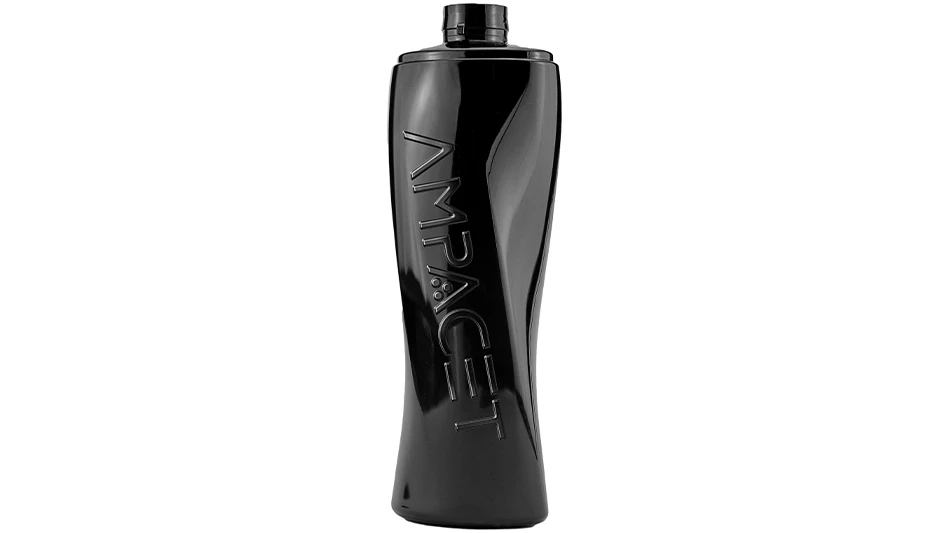
Photo courtesy of Ampacet Corp.
Ampacet Corp., a Tarrytown, New York-based company that specializes in color and additive masterbatches, is taking steps to increase the recyclability of black plastics.

testing to see how well its Rec-NIR-Black products
can work with Pellenc’s near-infrared optical sorting
equipment. The testing discovered optimal conditions
and parameter adjustments to accurately differentiate
transparent PET packaging items from dark ones.
The first development is the introduction of a black coloring agent that is compatible with near-infrared (NIR) optical sorters used to separate polyethylene (PE) plastics at recycling facilities.
To recycle plastic packaging into usable resins, the material is presorted by resin type at material recovery facilities (MRFs). Plastic must be sorted into separate monomaterial streams to retain its properties, such as PE, polyethylene terephthalate (PET), polypropylene (PP) and polystyrene (PS).
Presorting is typically is done with NIR optical sorters. However, NIR optical sorting usually cannot identify and separate plastics that contain carbon black—the most commonly used black pigment. Carbon black absorbs a significant part of the ultraviolet (UV) and infrared spectrum, preventing the reflection of infrared light back to the sensor and blocking the sorting equipment from recognizing the resin’s fingerprint via NIR scan. As a result, most black plastics either are landfilled or incinerated.
Ampacet recently announced the addition of Rec-NIR-Black PE 512 to its carbon-free Rec-NIR-Black masterbatch range. The new additive is NIR-detectable while providing a high level of opacity for use with PE in flexible applications like packaging, the company says.
However, Rec-NIR-Black PE 512 is suitable only for indoor use because, unlike conventional carbon black masterbatches, it does not provide a stabilizing effect against UV degradation.
In a second development, Ampacet and Pellenc ST, a France-based company that develops and sells sensor-based sorting equipment, have partnered on studies to optimize the recyclability of both black and clear PET packaging on sorting lines that employ NIR sorting technology.
The mechanical and optical characteristics of clear recycled PET (rPET) flakes obtained from recycling clear items generally are close to virgin resin, according to the companies. Clear rPET flakes are used in a variety of high-value applications, including water bottles and food containers.
However, optical scanners used at MRFs have difficulties identifying transparent from dark plastics because the visible domain spectrometers installed above the conveyor belts have difficulty distinguishing dark containers from transparent ones on the black belts.

near-infrared optical sorters used to separate polyethylene plastics at recycling facilities.
Sorting tests carried out by Pellenc ST on PET containers colored with Ampacet Rec-NIR-Black products allowed Pellenc ST to establish the optimal conditions and discover how parameters can be adjusted in the computer algorithm to accurately differentiate transparent packaging items from dark ones and direct them to the correct streams.
“Pellenc ST is happy to contribute to the validation of detectable black dyes to be used in plastic packaging,” Pellenc Chief Scientific Officer Antoine Bourely tells Plastics Recycling via email. “With the Ampacet dye, we can detect not only the material, but also tell the difference between black and transparent plastics, even on a black background.”
The companies say tests were carried out using Pellenc’s new Mistral+ Connect optical sorter and previous versions of the machine.
“Pellenc ST and Ampacet collaboration on sorting studies allowed us to optimize the recyclability of dark PET packaging on existing recycling lines,” says Philippe Hugelé, Ampacet’s strategic business manager of rigid packaging.
“Ampacet’s wide range of innovative masterbatch solutions supports customers in achieving their sustainability objectives and voluntary commitments through improved product designs for the circular economy, optimized content of postconsumer recycled material, reduction of fossil-based raw material consumption and adoption of alternative end-of-life scenarios,” he adds in a statement provided to Plastics Recycling. “The Ampacet Rec-NIR-Black range contributes to the circular economy initiatives.”

Explore the Spring 2023 Plastics Recycling Issue
Check out more from this issue and find your next story to read.
Latest from Recycling Today
- Orion ramping up Rocky Mountain Steel rail line
- Proposed bill would provide ‘regulatory clarity’ for chemical recycling
- Alberta Ag-Plastic pilot program continues, expands with renewed funding
- ReMA urges open intra-North American scrap trade
- Axium awarded by regional organization
- Update: China to introduce steel export quotas
- Thyssenkrupp idles capacity in Europe
- Phoenix Technologies closes Ohio rPET facility





